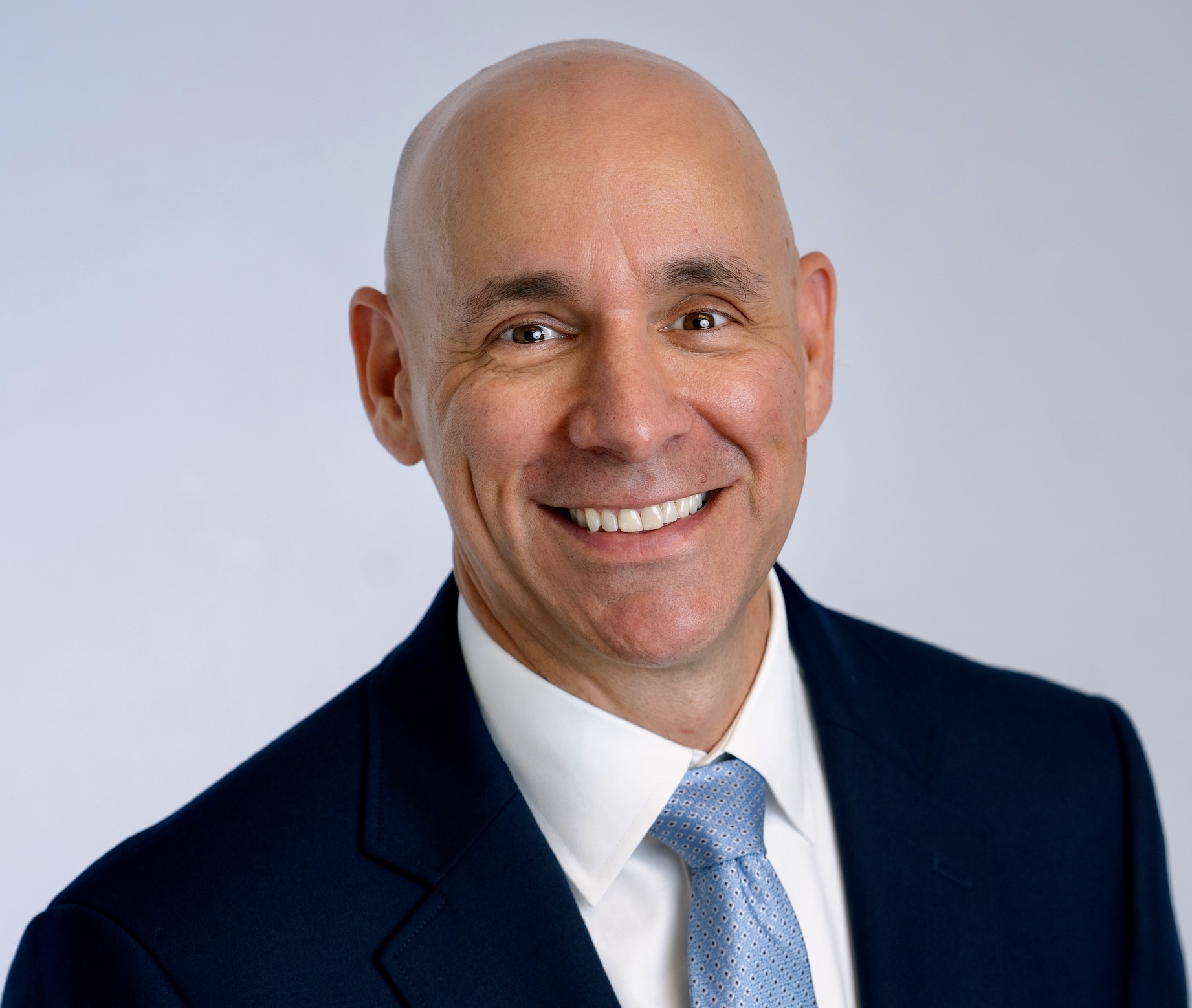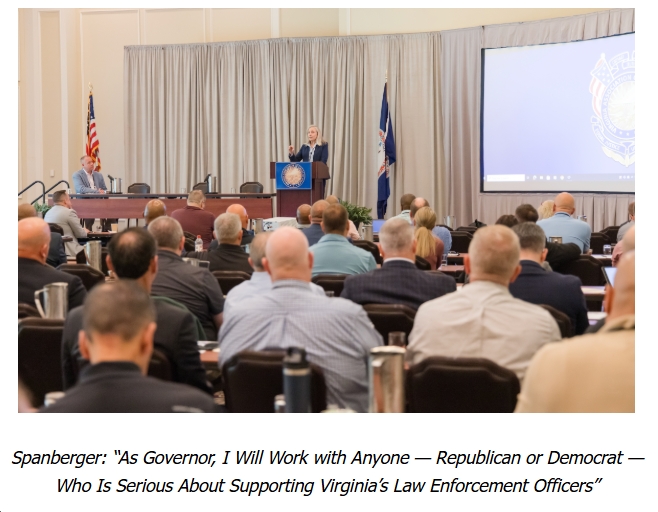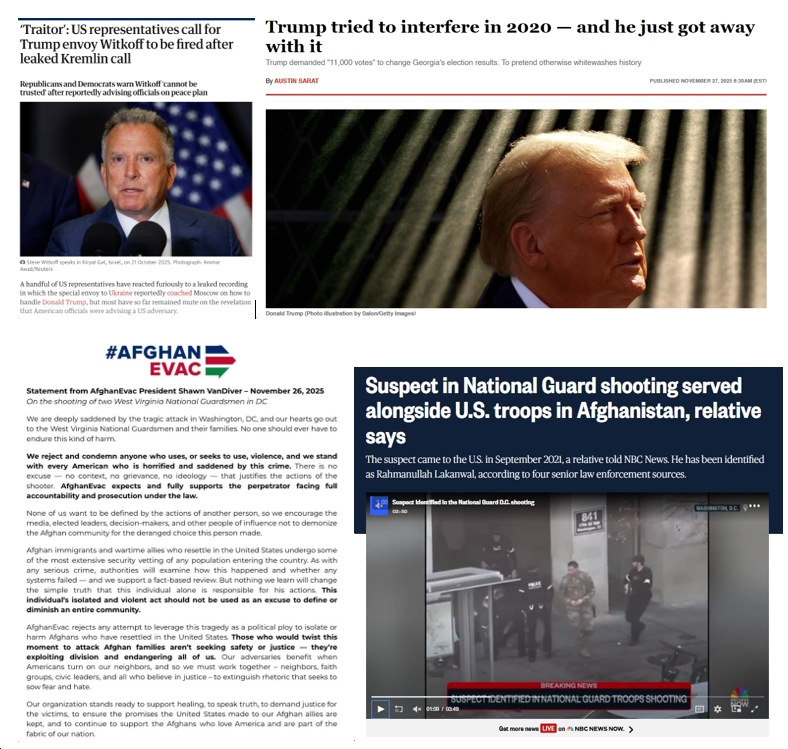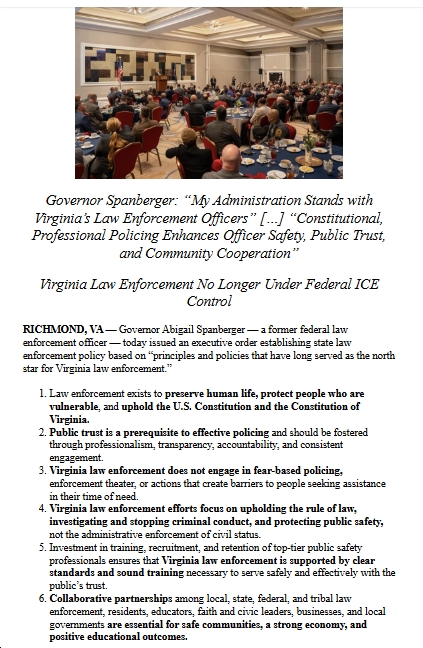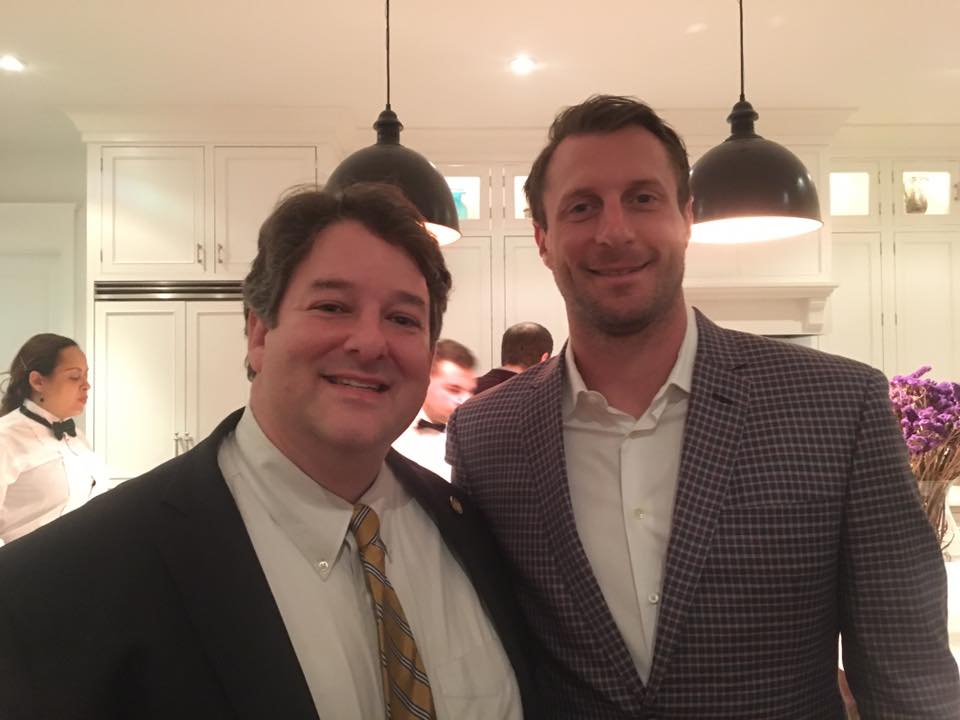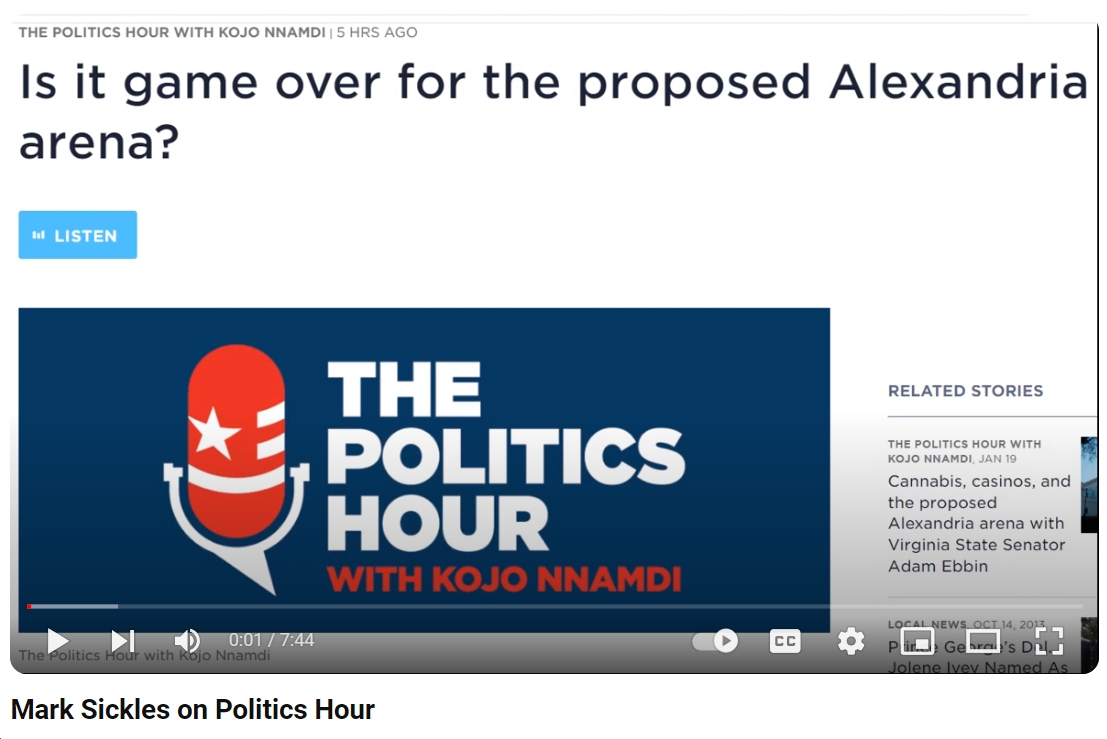This past Monday, I had a chance to sit down in Leesburg with the Democratic nominee for Loudoun County Commonwealth’s Attorney, Buta Biberaj, for an on-the-record interview. As I wrote recently, Biberaj is super smart, and she understands the balance between making progressive criminal justice reforms while of course protecting the public and advocating for victims. I strongly encourage everyone to support her in the general election, presumably against Republican Nicole Wittmann (current Chief Deputy Commonwealth’s Attorney to Loudoun County Commonwealth’s Attorney Jim Plowman).
As for our interview, it was a couple hours long – and thanks again to Buta Biberaj for her time! – covering a WIDE array of topics, some more specific to Loudoun County, but most of which have come up frequently in other Virginia Commonwealth’s Attorney races this cycle, including in Arlington/Falls Church and Fairfax County. Personally, I think it’s very interesting to compare and contrast Biberaj’s thoughts on an array of subjects, including:
- seeking the death penalty – or not
- “prosecutorial discretion” (how much should there be? should a Commonwealth’s Attorney just unilaterally say they’re not going to prosecute certain laws)
- racial disparities in the criminal justice system
- prosecuting (or not) for marijuana possession
- “discovery” – how open should it be?
- cash bail – when (if ever) it should be used
- the importance of courtroom and managerial experience to being qualified for this position
- the Commonwealth’s Attorney as most definitely NOT one who sits at the desk, but actually getting in the “trenches” by being in the courtroom frequently
- cooperation – or not – with ICE
- the civil asset forfeiture system
- the amicus brief regarding Gov. McAuliffe’s restoration of rights to ex-felons
- views on running for office
- how the current Loudoun County Commonwealth’s Attorney’s office is doing and what needs to change
- views on her Republican opponent
- what the main job of the Commonwealth’s Attorney should be – protecting the community and preventing crime? advocating for victims of crime? reforming the system? other? all of the above?
Given that the interview covered so much ground, I’m going to do this in several blog posts. Yesterday, in Part 1, I focused on who Biberaj is, her reasons for running, her views on what the main job of and qualifications for the Commonwealth’s Attorney should be, and also her views of her Republican opponent. Today, in Part 2, the focus is on prosecutorial discretion, racial disparities in the criminal justice system, the “discovery system,” and the role of the Public Defender’s office vis-a-vis the Commonwealth’s Attorney.
By the way, I gave Biberaj a chance to review the transcript of our interview for accuracy, and have incorporated her (very minor) edits. Finally, I’ve added bolding for things that particularly jumped out at me. Enjoy!
P.S. I was struck by how much I agreed with Biberaj on pretty much everything she said. The bottom line is that I am very much in sync with her regarding the Commonwealth’s Attorney job, its qualifications, etc, etc.
Blue Virginia: How “open” should the discovery process be? To what degree should information be held back to protect victims and witnesses, or for any other reason? Or should it be “open file discovery?”
Buta Biberaj: “You have to have that fairness in mind. The rules for discovery that we have in place right now are very limiting. And I think they tend to result in unjust results. Where we should protect information is if there’s a fear or a threat of any sort of harm or potential harm to a victim or to intimidate a witness…that’s a given. I don’t think anybody will dispute that…You have to understand at the end of the day, you want the right answer, and if I’m ambushing you as a prosecutor, that’s not the right answer. If I am sitting here and I’m holding back information or saying to you I’ve given you everything except for, but I don’t tell you even “the except for”, that’s not appropriate. Because then at that point in time you haven’t even educated the accused as to what the evidence is against them. Show the evidence. If you’re confident in your case, show them the evidence….[You can protect victims and witnesses], you redact stuff, that’s standard.”
Blue Virginia: What is the role of the public defender? Should it be an adversarial sort of relationship or should the commonwealth attorney also be like a public defender essentially or should the Commonwelath’s attorney be focused on going after criminals more and the public defender’s office I mean… what’s the division of roles and labor between those those offices exactly I’m a little confused about that?
Buta Biberaj: “So the legal system, not just the criminal justice system, but the legal system is set up to be adversarial – intentionally so. You as a defense attorney or public defender have the obligation to represent your client zealously. As a prosecutor, my job is to do justice. So this is where my position can fluctuate, it’s fluid. So if I have a case that I’m being tasked to prosecute but I learn that maybe you’re not the person who did it, so I could say yes I’m gonna prosecute anyway because I think I can prove it even though I think half of my evidence is not valid or truthful, well that’s not something we want from our prosecutor’s office; we want the integrity and we want the transparency and we want justice. And justice…means how do we get the right outcome for our community. So the two positions are opposite but not opposite in its purity in a sense that we’re always just about the win; prosecutors shouldn’t be about the win; prosecutors should be about the justice.”
Blue Virginia: Both should be seeking justice, right?
Buta Biberaj: “But this is where from the defense side, their task is to – as is both sides – uphold the Constitution. Their part is can the government prove the case…As a defense attorney, let’s assume hypothetically you’re aware that your client committed the offense. Your job is not to concede that if the government cannot prove it. Because you want to hold that standard of proof beyond reasonable doubt…we must protect the process so we don’t lose faith or trust in it. If you cut those corners because you believe something happened, and act unfairly or unethically to get the outcome ‘you believe’, then what happens to our faith and trust, to justice, when later it was proven you were wrong?
The issue is as a community – if this was somebody that was your neighbor’s kid or your kid or you know somebody you cared about how would you want the system to work? And even if in that example, that they are the victim, how do you want the system to work? If they’re the accused how do you want the system to work? These are things that we want to be able to do is say how do we make it work best and most fairly for all. That is a task that is pretty serious, it’s a significant task, but you have to aspire to do it perfectly well right? Because you will not 100% do it perfectly well, but we are not okay with starting with the goal of 20% or 50%…”
Blue Virginia: So you start off with the goal of 100%?
Buta Biberaj: “Yes.”
Blue Virginia: Then we get into another important issue – prosecutorial discretion, that’s come up a million times; how much prosecutorial discretion should a C.A. exercise? For instance should a C.A. not prosecute because they don’t personally agree with the law? This came up the other day, for example on let’s say abortion laws. Let’s say Virginia passed a draconian Alabama style abortion law, should you just be like I’m not prosecuting that I don’t agree with it or our community doesn’t agree with it? Or gun laws or marijuana laws or LGBT anti-discrimination laws or whatever?
Buta Biberaj: “Well you’ve gotta pick and choose the hypothetical to pose, because everything has a specific response – for this reason. For starters, the prosecutor has a significant amount of discretion. So when you say should they not prosecute, it’s hard to say you should not prosecute a law that is a law. Because that’s really what your task is.”
Blue Virginia: The legislature passes a law and the governor signs it into law, then it’s on the books, it’s a law?
Buta Biberaj: “It’s a law.”
Blue Virginia: Your job is to follow that, [given that] you swear an oath?
Buta Biberaj: “You swear an oath, the first one is to uphold the Constitution. So if there’s a law that you believe is unconstitutional, so there’s a different issue. If you have a law that you think is being somewhat unfairly exercised, let’s assume you have the over-policing of something, overcharging of something, so you have some of that discretion as well. I think the strength of the prosecutors is not necessarily saying well I’m not going to prosecute those, but it’s going back to your legislature, because you have a lot of persuasive power with the legislation. You can’t make law, but I can talk to you as a legislature and say there’s something wrong here, and let’s talk about the how and why, and let’s have data, because I’m not just talking crazy, let me tell you what’s happening in my community. This is how many charges we have, this is where it’s going, this is how it’s being used, this is how it’s being misused, I need your help to do better for my community. So you have that ability to be able to impact the laws but if you are sitting there and you’re saying you know what, I’m not going to take a crime that is a common crime and I’m not going to prosecute it, I think you’re sending the wrong message. Then I’ll give you the example of adultery…because it’s also the community, so you have to be mindful of that, where does your community stand on those things. Because if you start prosecuting every adultery charge, what are you doing?
Fornication is on the books. So are you literally gonna start taking these kids after prom or something like that in the back seat of the car… that’s a horrific charge to have on your record…That’s where prosecutorial discretion comes into play. What do you need to keep your community safe? Really at the end of the day it’s a safety issue.”
Blue Virginia: There was a case in Arlington that’s come up with that in that campaign about two kids I guess put soap or something in their teachers coffee [note: see here] to harm the teacher, apparently, and one of the candidates is accusing the other one of prosecuting them too harshly. What do you do in a case like that, where they are kids but are trying to harm someone?
Buta Biberaj: “What you are dealing with are very specific facts, that’s pretty egregious. If somebody put something in your iced tea, maybe it tastes funny…so you literally are at their mercy…and if it’s happening in the school system which is much more controlled…and when that happens, the entirety of the school loses their trust in that community. Because now I have to worry about, I didn’t realize I had this problem with you, I know we maybe disagreed…but oh my gosh….maybe the kids didn’t understand the full potential…did they really understand it could kill somebody.”
Blue Virginia: It feels like in these campaigns everything gets painted as black and white and very simplistic and it can be very frustrating listening to this debate. Is there a clear answer in that case one way or the other?
Buta Biberaj: “No.”
Blue Virginia: That gets into discretion…how much of this is just cut and dry, here’s a law, that’s what you do you enforce? And how much of it is really gray, it really depends on the specific circumstances of the situation – who the perpetrators were, what exactly happened, what is the context, take that all into account and then you look at the law and you decide how to prosecute, what to prosecute? Is that more your view?
Buta Biberaj: “It is a broad question, so I’m not going to give you a cut-and-dried answer – because there is not one, and for this reason. The law can be pretty black-and-white, so if you’ve got an accusation of a criminal offense, you as a prosecutor, you have to look at, are all the elements there? So you have a duty, if the elements are not there, then you should not be prosecuting it; you shouldn’t be using the power of stacking – I can add more charges than I’ll be able to make to bully you into it; I shouldn’t hold you in custody pretrial so I could bully you to you now accepting a plea; I shouldn’t take advantage of you having a less able attorney. So these are things that you as a prosecutor are actually charged with protecting the entirety of the community. It’s a very vast responsibility. If you have those elements, then the point does become what was the crux of the harm? So if let’s assume, the kid situation with the drink – rather than putting something that potentially could be poisonous and could kill you, what if I put something in there that just was salt….things are very gray, what was your intent? Did you understand that? Those are things that make the prosecutor’s job hard, because we have to get away from just prosecuting on paper; we have to realize that we’re prosecuting people.
What you want to be able to do is within the school system is be able to afford the community’s sense of safety, have the consequences so kids or anybody else understands you can’t do that. I can be mad at you, but I can’t harm you or try to harm you; that’s not the right, appropriate action. What are my coping skills as a juvenile? So you have to bring in the school system, the school counselors because I’m assuming this these two kids may not be the only ones who may have had similar thoughts. But they acted on it. So how can we draw from that to teach the others, you have to take other means, this person is doing something that’s offensive or maybe mostly harmful, let’s go talk to your parents…talk to your school counselors…but there’s other means so that we know how to deal with these things, because we’re building their abilities at this age for how they’re gonna act as adults. So if your reaction as a kid is always to be reactionary and aggressive, it doesn’t change when you hit 17 or 18 or 20, and could get worse.”
Blue Virginia: So the job of the Commonwealth Attorney is broader than just a mindless, rote sort of “this is a law, I am a robot, enforce the law,” right?
Buta Biberaj: “I think you do a disservice to your community when you do that.”
Blue Virginia: If you see racial disparities, let’s say with marijuana laws, what do you do?
Buta Biberaj: “This again is the synergy of the different entities; you sit down with the sheriff’s office let’s talk about what’s going on. You sit down with the magistrate’s office. We are identifying this, but you need statistics you need the data. Why are we having 50% of the African Americans accused when they’re only 15% of the population? So we know it from an anecdotal perspective, it’s a legitimate concern, you have to sit down with the law enforcement, addressing implicit bias has to be across the board, you have sit down with our judges as well and talk about this implicit bias. Because we have to educate ourselves. It doesn’t make us bad people, it doesn’t make us prejudiced, it doesn’t make us haters, it just says hey, our lens and our experience has us viewing something a little bit differently that we might want to account for and, where necessary, change.”
Blue Virginia: But should the commonwealth attorney just unilaterally…say, I’m just not going to prosecute that?
Buta Biberaj: “I don’t think you can make such a blanket statement because you’re sending messages to different people that are not in line with what you want to do which is at the end of the day is to have a safe community. So if I say I’m not gonna prosecute marijuana, what is the message I’m sending to 15, 16, 17 year-olds?”
Blue Virginia: I guess that they can smoke marijuana?
Buta Biberaj: “Right, what is the message, what is then the net consequence? I can’t say if you’re underage drinking I’m not gonna prosecute you. I don’t think you could take a blanket statement and say I will not prosecute it. I think this is where you use your powers of influence, powers of persuasion, powers of community, to say what do you need…as a parent, you have kids at home, you know when you’re getting into that car, it smells like marijuana. We as a community should be talking to you parents, don’t let your kids drive the damn car, take away that privilege…We need to start talking to schools; we know which kids are coming in and who are known to either be using…let’s have that conversation…we need to change your behavior, because the criminal justice system by itself is not the answer for all….It’s a situation if we could get individuals who change their behavior before they become accused or defendants or victims, that’s the community, that’s much better…you don’t have a victim. You are focusing on prevention over prosecution.”
Blue Virginia: Overall though you would say the C.A. has a lot of prosecutorial discretion – almost unlimited? How much discretion does and then should a C.A. have?
Buta Biberaj: “How much do they have? Almost unlimited, because it starts from the charge…So even if law enforcement comes in and files a charge, the prosecutor’s office has the right and the discretion to change that charge as they deem appropriate.”
Blue Virginia: Wow that’s a lot of power.
Buta Biberaj: “That’s amazing power.”
Blue Virginia: I think a lot of legislators would argue no your job is to do what we told you to do.
Buta Biberaj: “I think those that understand the law will tell you that it’s there to be used as it’s appropriate for your community. Because think about every law that we have. We have some laws on the books that were created from reacting because of a single incident, but they’re not suggesting that every community adopt it…”
Blue Virginia: So in a progressive community like Arlington, let’s assume you have a progressive Commonwealth Attorney, and let’s say they decided they weren’t gonna prosecute some law that I thought was outrageous because it was anti-LGBT or whatever. But what about in the conservative areas of the state, red areas where you have a very maybe gun-loving, anti-LGBT, anti-abortion, whatever it is, Commonwealth Attorneys, and let’s say we take back the legislature and let’s say we pass a bunch of progressive laws environmental protection, and there’s a C.A. who say I don’t care if you passed the law I’m not prosecuting it. I don’t care if factories are dumping sludge into the river I’m not prosecuting, it I think it’s great, we need jobs we need factories. I don’t care about LGBT I don’t like them.
Buta Biberaj: “Well this is this is one of the concerns that I’ve had with the C.A.’s office; there’s no accountability because there’s no transparency. If there’s something that’s lacking integrity, none of that is exposed, so that’s what you need to have is you need to have the transparency within that office and the data will help to understand what is happening. So you could say how many cases have come before the prosecutor’s office for, let’s say, dumping of sludge, and do they have that ability to be able to you know prosecute you for trespassing or destruction of property…and if it’s not being prosecuted…why not?
Let me give you more of a Loudoun example. We are allowed to have guns, Second amendment. We’re allowed to open carry again Second Amendment. Loudoun County does not have any general restrictions on your carrying a gun, as long as you are otherwise not excluded, such as court action, haven’t been a convicted felon or something that’s taken away this right, so we’ll exclude those facts from this example…We’ve had a couple of incidents in developed communities where people who are in open space are shooting and target practice or whatever – fine and dandy. But the problem is when it, the bullet, then traverses beyond the protected area and now it’s hitting your house…that’s when the prosecutor has to get involved. So I’m not trying to take away your gun. But if you don’t know how to use it safely then maybe you shouldn’t have it or maybe we should have that conversation, or maybe we should have some agreement as to where and what your limitations are. Because it’s no different than you driving. I don’t want to take away your driving privileges, but if you don’t know how to drive safely, you shouldn’t be behind a wheel.”
Blue Virginia: I was trying to get it more the discretion issues again because like I mean again I’m more comfortable with it with a progressive because I’m progressive, but if we set that precedent sort of for CAs that they have almost unlimited discretion, then can’t right-wing ones in “red” areas also decide which laws they want to enforce – or not enforce?
Buta Biberaj: “Why are you saying setting the precedent; it already exists….You’re looking at discretion as it being less prosecutorial? Let me tell you this. We had a case where a guy out in Ashburn ended up stealing tires from six cars. The prosecutor ends up charging him with six grand larceny, six grand larceny theft with the intent to sell, because he was trying to support his drug addiction, and six destruction of property, the jury finds him guilty of 18 offenses….This is the integrity part, or the lack of integrity…the prosecutor then puts old sentencing records from this person which shows for one charge he had a drug possession he got ten years and all but 6 months was suspended…So I think the message that is a misleading message that’s being communicated to the jury is you could pick any number you want because somebody’s gonna fix it and they’re going to significantly suspend the sentence. The jury recommends 132 years…his guidelines which are discretionary on the state level in Virginia were two to four years. The judge, when he fills out the sentencing order it asks did you impose the jury sentence, and he says no too excessive. It says did you impose the guidelines? No. Why? Because of the jury’s recommendation. He imposed 17 active years for this guy to serve. This was one of the reasons why I decided to run. Because I started looking at it as a tax payer, I pay taxes as a business owner, I pay taxes as a homeowner, I pay taxes as somebody using gas…that’s $425,000 that you took from my tax base to lock somebody up for stealing tires. You maybe look at that as being an investment, I look at that as being a divestment. How many police officers could I have hired or social workers or school teachers or send somebody to a program so that when he’s done with that he’s an active participant? So you’re making me bear that heavier burden of all these services by myself.”
Blue Virginia: Yeah that seems like really tough on crime in the sense of stupid on crime that’s not smart on crime.
Buta Biberaj: “So that’s discretion. The prosecutor’s office use their discretion to load up…You have individuals who are talking about marijuana, there have been some prosecutors who’ve indicated that they will not prosecute at all. Again my concern is always this – what message is that being sent to a young person? We know the brain doesn’t completely develop until about 26 or 27. Studies also show that the use of marijuana negatively impacts that. So again what’s the greater good? I don’t want you to have a criminal record – I don’t. Can we do something to decriminalize it but still have some consequences? Because I don’t want you to take that as a stamp of approval, yes I can. That’s again where the community comes into play and you say look, what do we want to do? Every parent of any kid I have ever represented that has had a possession of marijuana charge was always like, well how could this be so serious, how could this be a permanent record? Because now they’re invested. But we want that same attitude to be more global. It’s not you kid, it’s your neighbor’s kid. It’s not your neighbor’s kid, it’s some random kid down the street. Don’t you want that same opportunity for success? At the end of the day, they’re our community members.”
Blue Virginia: Do you believe the US criminal justice system is inherently unfair biased against people of color so what should be done to fix that situation?
Buta Biberaj: “YES, to answer the question. We see it. We see it in the types of charges that are put on individuals, they’re disparate. The types of plea offers that are offered – disparate. The type of trials that take place – disparate. Sentencing – disparate . Opportunities – disparate. So yes, at every level you see it, and that’s data based – you can see it, so it’s not just somebody saying oh my gosh I think this, no this is straight out legitimate, yes it is. How do we change it? I think for starters we acknowledge it. Acknowledge it. Again it doesn’t make us a bad person; it’s when you’re naive and ignorant and choose to remain that way, that that causes lack of opportunity. If you own it and say you know what oh my gosh you’re exactly right, now you have the opportunity to revisit it, you have the opportunity to change your lens. How we end up doing that is by educating people and we have to do that as a community. We have to stop looking at our differences and start looking at how we are much more alike. You will always see color you will also always see sex, so nobody can change their color skin or the sex that they’re born with. As to how you present. I don’t know what your religion is, I don’t have to know that. I don’t know what your beliefs are as far as political, I don’t know have to know that. Until you speak or do something I don’t know that. For those two things we do always see you. So if we’re looking at data and it’s saying that we’re treating people disparately, then it goes back to the education, the implicit bias. Start with the prosecutor’s office, start with the public defender’s office, with attorneys, law enforcement, judges, everybody has to acknowledge that and then how are you going to own it?”

